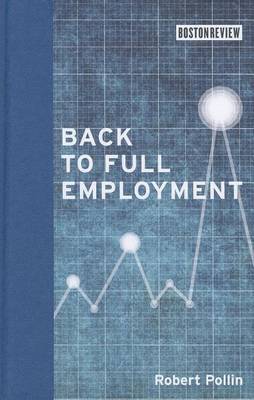Boston Review Books
2 total works
Why we should put full employment back on the national agenda and how we can summon the political will to achieve it.
Full employment used to be an explicit goal of economic policy in most of the industrialized world. Some countries even achieved it. In Back to Full Employment, economist Robert Pollin argues that the United States-today faced with its highest level of unemployment since the Great Depression-should put full employment back on the agenda.
There are good reasons to seek full employment, Pollin writes. Full employment will help individuals, families, and the economy as a whole, while promoting equality and social stability. Equally important, creating a full-employment economy can be joined effectively with two other fundamental policy aims: ending our dependence on fossil fuels and creating an economy powered by clean energy.
Explaining views on full employment in macroeconomic theory from Marx to Keynes to Friedman, Pollin argues that the policy was abandoned in the United States in the 1970s for the wrong reasons, and he shows how it can be achieved today despite the serious challenges of inflation and globalization.
Pollin believes the biggest obstacle to creating a full-employment economy is politics. Putting an end to the prevailing neoliberal opposition to full employment will require nothing less than an epoch-defining reallocation of political power away from the interests of big business and Wall Street and toward the middle class, working people, and the poor, while mounting a strong defense of the environment. In the end, achieving full employment will be a matter of political will: Can the United States make having a decent job a fundamental right?
Achieving the target goals will be highly challenging. Yet in Greening the Global Economy, economist Robert Pollin shows that they are attainable through steady, large-scale investments -- totaling about 1.5 percent of global GDP on an annual basis -- in both energy efficiency and clean renewable energy sources. Not only that: Pollin argues that with the right investments, these efforts will expand employment and drive economic growth.
Drawing on years of research, Pollin explores all aspects of the problem: how much energy will be needed in a range of industrialized and developing economies; what efficiency targets should be; and what kinds of industrial policy will maximize investment and support private and public partnerships in green growth so that a clean energy transformation can unfold without broad subsidies.
All too frequently, inaction on climate change is blamed on its potential harm to the economy. Pollin shows greening the economy is not only possible but necessary: global economic growth depends on it.

